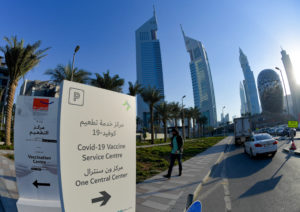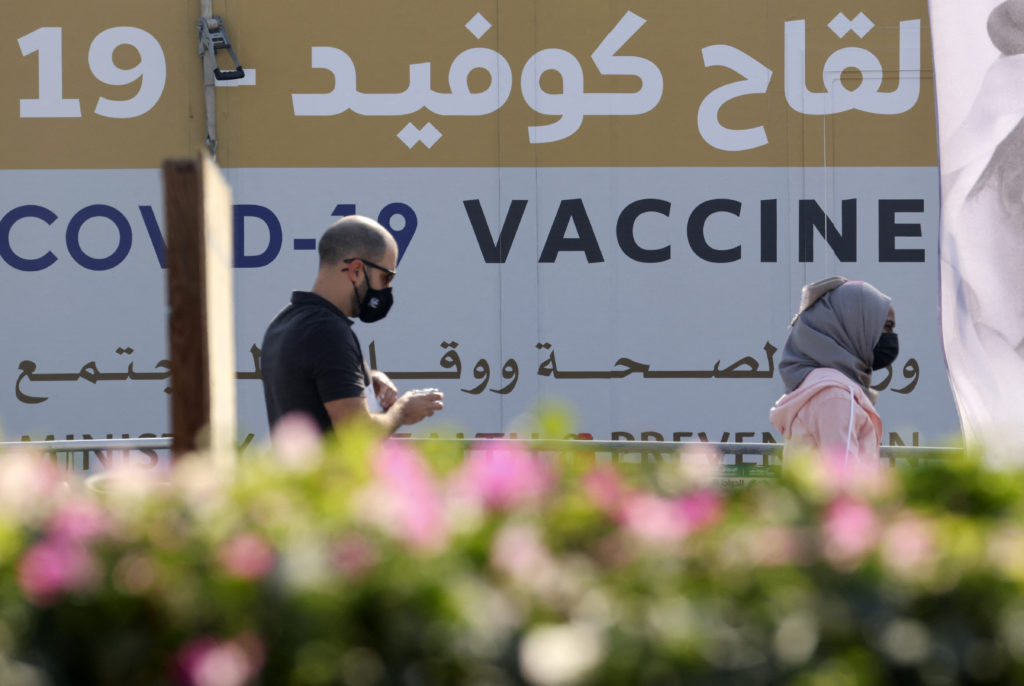São Paulo – The highly transmissible omicron variant of COVID-19 has been causing a spike in cases in the United Arab Emirates since early December. Solely this Tuesday (28), there were 1,846 new cases and one death. The moving average of the last seven days has reached 1,232 cases.
From December 14 to 27, there were 10,171 new cases, which is a high rate for the country of about nine million inhabitants and is in its peak tourist season. For comparison, on December 1, the daily moving average of the previous seven days was only 67 cases.

The Arab country has been introducing new measures to prevent the spread of the virus. In a statement, the Ministry of Health and Prevention of the UAE (MoHAP) announced it would continue to increase the scope of testing throughout the country to facilitate the early detection of COVID-19 cases and provide adequate treatment. The MoHAP also urged society to cooperate with health authorities, adhering to the national government’s instructions on wearing masks in public places, open or closed and practicing social distancing.
The country’s health authorities are urging residents to take the booster shot of the vaccines. Even with the spike in cases, the country continues to be among those that best dealt with the pandemic, with around 92% of the population vaccinated with at least two shots. Despite being more contagious, the omicron variant is considered less lethal, especially among vaccinated people.
The UAE were among the first countries to reopen borders during the pandemic. To date, 754,911 cases and 2,160 deaths from the disease have been registered since the pandemic outbreak. Information is from the country’s national news agency, WAM, with data from Johns Hopkins University.
New Year’s Eve celebrations will be held in Dubai. The emirate will have fireworks in many locations, including the Burj Khalifa and the Ain Dubai Ferris wheel.
There is no record of a considerable increase in COVID-19 cases in the neighboring Gulf countries.
Abu Dhabi enacts new entry restrictions
The emirate of Abu Dhabi, which already had stricter restrictions on the entry and movement of people, has now updated its policies. According to the Abu Dhabi Emergency, Crisis, and Disaster Committee, entry into the capital through the other emirates now requires a vaccination certificate or a negative PCR test carried out up to 96 hours before for unvaccinated people.
In addition, the committee resumed the access barrier to Abu Dhabi on the highways for visitors from other emirates, where they undergo a test via scanner, which detects symptoms of COVID-19. The test is quick, lasting about 2 seconds per person. According to health authorities, the EDE Scanners use facial scanning technology to detect the virus.
Expo 2020 Dubai
Some Expo 2020 Dubai venues could be closed for sanitation if cases of COVID-19 are detected, as organizers told the Khaleej Times newspaper on Tuesday (28). The Khaleej Times is the longest-running newspaper published in English in the UAE. The precaution is part of the Expo’s strict security measures against COVID-19, which aim to protect all employees, volunteers, and visitors.

Last week, a restaurant in the Japan pavilion was temporarily closed after several employees tested positive for COVID-19. Organizers also said they are doubling their commitment to hosting an exceptional and safe world exhibition.
The mega-event has increased the number of on-site testing posts to four and offers free PCR tests to all employees in the country pavilions. All frontline employees and artists continue to be tested regularly.
Even so, some high-contact events, such as parades, artist presentations on the alleys, and some shows, were temporarily suspended as a short-term precautionary measure, according to a press release. All visitors and employees must wear masks indoors and outdoors.
According to official sources, Expo 2020 Dubai registered 8,067,012 visits from its opening until December 27. The mega-event runs until March 31, 2021.
Brazilian tourists
The measures were maintained for those traveling from São Paulo to Dubai on Emirates airlines. It is necessary to carry out a PCR test up to 72 hours before boarding the flight, and another test will be conducted upon arrival at the Dubai airport. Also, many places in Dubai and other emirates demand vaccination certificates to allow entry.
Translated by Elúsio Brasileiro




